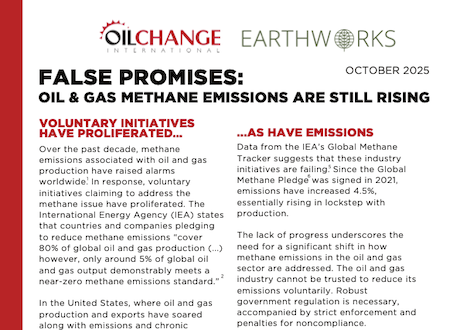
False Promises: Oil and Gas Methane Emissions Are Still Rising
Data from the lEA's Global Methane Tracker suggests that the fossil fuel industry's voluntary initiatives to reduce methane emissions are failing.
Oil Change International publishes upwards of 20 reports and briefings every year focused on supporting the movement for a just phase-out of fossil fuels.

Data from the lEA's Global Methane Tracker suggests that the fossil fuel industry's voluntary initiatives to reduce methane emissions are failing.

US non-profit Ceres has produced a paper aimed at explaining actions that oil and gas exploration and production companies (E&Ps) can take to reduce their emissions. It is also supposed to provide useful information on climate alignment to the sector’s investors and bankers. The paper suffers from a number of alarming weaknesses which threaten to reverse progress on setting standards for net-zero finance. Consequently, Reclaim Finance, Oil Change International, urgewald, CIEL, and Stand.Earth have jointly published this analysis in response.

This new analysis shows that over 47 Gigatonnes of CO2 could be released by extracting and burning fossil fuels from within protected areas.

New Briefing: Despite pledging to stop international financing for fossil fuel projects by the end of 2022, the Italian Government is continuing to actively consider financing for major international fossil fuel projects that could emit greenhouse gas emissions equivalent to at least 3.5 times Italy’s annual emissions.

Stopping these fossil fuel projects would prevent a drastic increase in GHG pollution at a time when it is imperative to decrease emissions to meet domestic and international climate goals, including the Paris Agreement that President Biden rejoined.

The API claims gas is the main reason US power sector emissions are down. Our latest analysis shows it's not.

The next president and Congress should reinstate the crude export ban in tandem with policies to ensure a just and equitable transition away from fossil fuels. A reimplementation of the ban would therefore require an ambitious and well-funded energy policy to prioritize justice and equity for workers and frontline and Indigenous communities in the necessary transition away from fossil fuels.

The proposed Jordan Cove LNG export terminal and Pacific Connector pipeline would be a substantial source of climate pollution for decades to come. This briefing provides an estimate of the project lifecycle emissions and provides the climate rational for rejecting the proposed project.

We find that Energy Transfer Partners' Rover Pipeline would lead to annual emissions of nearly 145 million metric tons of carbon dioxide equivalent. This would be the equivalent of adding 42 coal-fired power plants or over 30 million passenger vehicles.

The states of Washington and Oregon are facing a quadrupling of their crude-by-rail terminal capacity to over a million barrels a day. This report examines the impact that expansion will have on unlocking carbon and thereby exacerbating climate change.